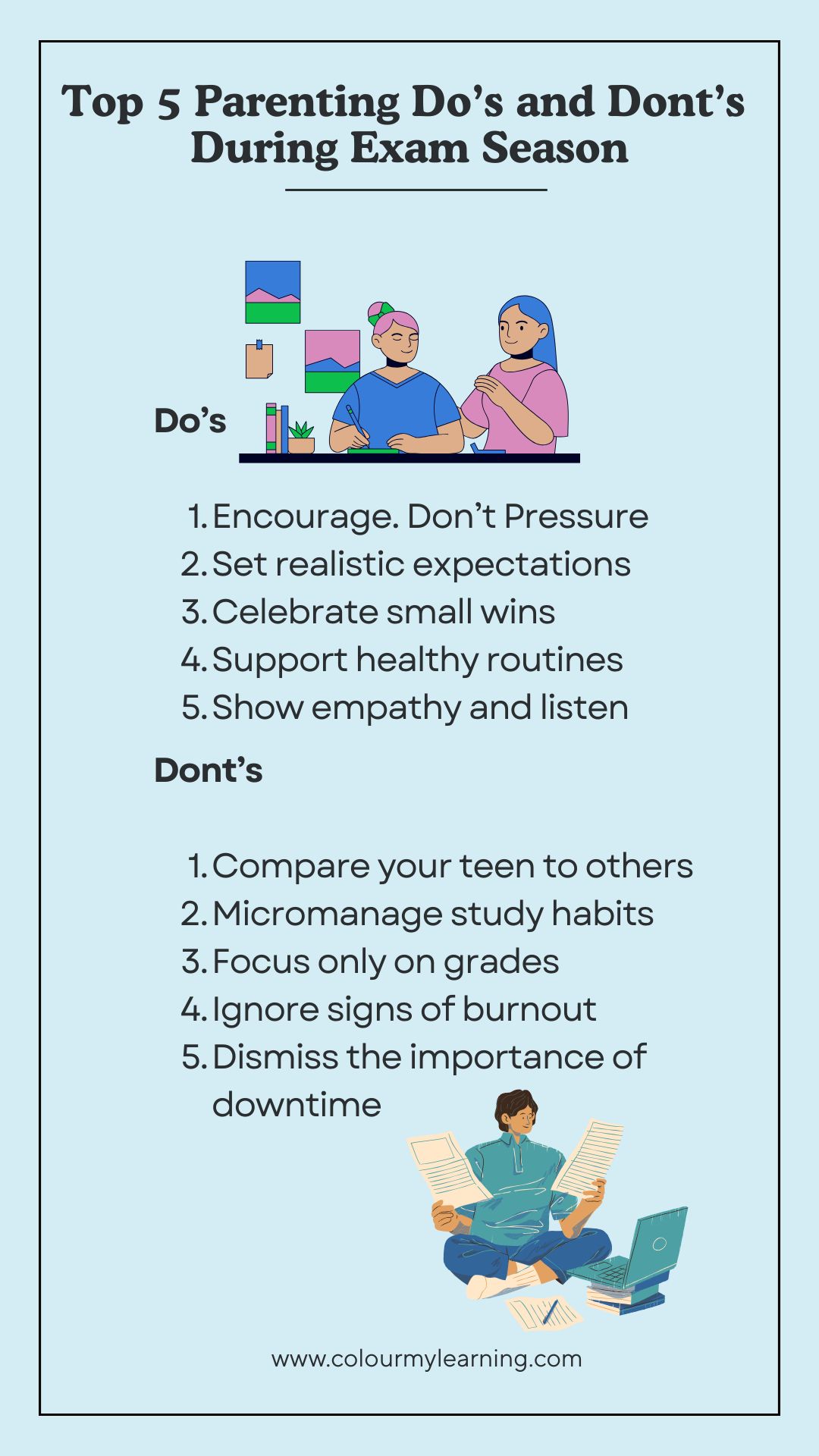Exam Support for Teens: Parenting Do’s and Don’ts That Really Work
Exam season is often a challenging time, not just for teens but also for parents. As stress levels rise and tensions build, many parents find themselves unsure about how to best support their teenager. Every parent naturally wants their child to succeed academically, yet pushing too hard can backfire, causing more anxiety and stress for everyone involved.
Motivation is a delicate balancing act—too much pressure can lead to burnout, and too little support might leave teens feeling lost and overwhelmed. Understanding how to provide the right type and amount of encouragement is crucial to helping your teen navigate exam season successfully.
Teens face immense internal and external pressures, from striving to meet their own high expectations to managing peer comparisons and the stress of future prospects. As a parent, your role in shaping their emotional environment can make a significant difference. Your attitude, words, and actions can either boost their confidence and performance or inadvertently undermine their efforts.
This guide will clearly outline key practical tips—do’s and don’ts—to help you motivate your teen positively through exam season. By thoughtfully managing your approach, you’ll not only support their academic success but also strengthen your relationship and foster lifelong resilience and confidence in your teen.
Do’s
1. Do Encourage, Don’t Pressure
Creating a supportive environment rather than a stressful one is essential for motivating your teen during exams. Genuine encouragement involves noticing their hard work, acknowledging their efforts, and reinforcing their strengths positively. Use affirmations like, “I see how dedicated you are,” or “I’m proud of how far you’ve come,” rather than pressure-driven statements like, “You must score high,” or “You can’t afford to fail.” Encouragement boosts self-esteem and fosters intrinsic motivation, making teens feel valued and empowered rather than burdened.

2. Do Set Realistic Expectations
Setting realistic and achievable goals helps your teen remain focused and optimistic throughout exam season. Engage your teen in honest conversations about what they feel they can achieve, and collaboratively set practical milestones. Frequently reviewing these goals together allows adjustments based on progress and prevents overwhelming or unrealistic pressures. Teens who understand and believe in their goals tend to stay more committed and motivated, significantly reducing exam-related anxiety.
3. Do Celebrate Small Wins
Every step forward counts, especially during the rigorous exam period. Celebrating even minor accomplishments or improvements can significantly uplift your teen’s spirits. Recognise moments like mastering a difficult topic, completing revision sessions, or maintaining consistency in their study routine. Simple gestures such as verbal praise, a special snack, or a relaxing activity can positively reinforce their effort and inspire them to keep moving forward. These celebrations remind your teen that you value their effort as much as their outcomes.
4. Do Support Healthy Routines
Exam performance greatly depends on mental and physical health, which is why maintaining a balanced routine is essential. Encourage your teen to prioritise sufficient sleep, regular physical activity, nutritious eating habits, and structured downtime. Adequate sleep improves concentration and memory, exercise reduces stress and enhances mood, nutritious meals provide sustained energy, and regular breaks help prevent burnout. Supporting your teen in establishing and maintaining these healthy habits creates an optimal environment for success.
5. Do Show Empathy and Understanding
Teenagers often feel isolated or misunderstood during the intense period of exam preparation. Demonstrating empathy involves actively listening to their concerns, acknowledging the validity of their feelings, and responding with compassion and understanding. Create opportunities for open dialogue by asking gentle questions and patiently listening without immediate judgment or unsolicited solutions. When teens feel genuinely heard and understood, they are more likely to communicate openly, seek help when needed, and feel emotionally supported through challenging moments.

Don’ts
1. Don’t Compare Your Teen to Others
Comparing your teen to peers or siblings can inadvertently damage their self-esteem and increase anxiety. Each teen has unique abilities, strengths, and challenges. Rather than highlighting how they measure up against others, emphasize their individual progress and personal achievements. Focus your feedback on their specific improvements, effort, and dedication, reinforcing the idea that their journey is personal and valuable in its own right.
2. Don’t Micromanage Their Study Habits
Micromanaging your teen’s study schedule or methods can lead to frustration, resistance, or a lack of confidence in their own abilities. Trust your teen to develop study strategies that align with their learning style. Offer guidance and support when asked, but prioritize fostering independence. Allowing them autonomy helps build essential skills like responsibility, time management, and decision-making, crucial for long-term academic and personal success.
3. Don’t Overemphasize Grades Alone
Grades are important, but fixating exclusively on outcomes can unintentionally amplify stress and reduce intrinsic motivation. Encourage your teen to appreciate the learning process itself, emphasizing qualities like perseverance, effort, and improvement. Highlighting the value of learning beyond exam results helps foster a growth mindset, resilience, and ongoing motivation to learn, which serves them well beyond exam season.
4. Don’t Ignore Signs of Burnout or Anxiety
It’s crucial to remain alert to your teen’s emotional and physical wellbeing during the exam period. Signs of burnout or anxiety, such as mood swings, fatigue, loss of appetite, or withdrawal from usual activities, must be taken seriously. Engage gently and sensitively with your teen if you notice these signs. Offer reassurance, discuss their feelings openly, and seek professional guidance or counseling if necessary. Early intervention is key to supporting their mental health effectively.

5. Don’t Underestimate the Value of Downtime
Downtime is not merely a luxury during exam season—it’s a necessity. Teens require adequate leisure time to rest, recharge, and maintain a balanced perspective. Encourage your teen to engage in relaxing and enjoyable activities such as hobbies, sports, or socializing with friends. Quality downtime helps reduce stress, refreshes their mind, enhances overall productivity, and ensures that their study periods are more effective and focused.

Conclusion
Your role as a parent during exam season can significantly impact your teen’s emotional and academic success. By thoughtfully applying the strategies outlined above, you’ll be able to help your teen navigate the pressures of exams more effectively, and also strengthen your relationship with them. Remember, exam results do not define your teen; the qualities they develop during this period—such as resilience, perseverance, and self-awareness—are valuable lifelong skills.
The support, empathy, and understanding you provide during exam season can have lasting positive effects, fostering confidence, self-belief, and a balanced approach to future challenges. Exams come and go, but the bond and trust you build with your teen during these crucial times endure. How you parent helps shape them into resilient, motivated, and confident individuals.
Also read:
How to support your teen during exam season – 6 essential points to remember
How To Ace That Exam: Optimising Learning
We’d love to hear your experiences! Share your tips or strategies in the comments below, and explore other supportive resources right here on Colour My Learning.










